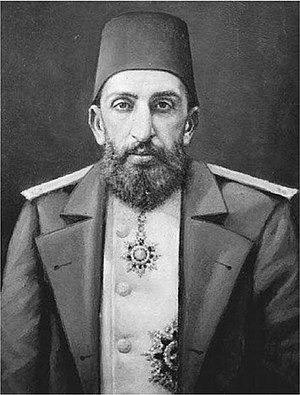
Abdul Hamid II (21 September 1842 – 10 February 1918) was the 34th Sultan of the Ottoman Empire and the last Sultan to exert effective control over the fracturing state. He oversaw a period of decline, with rebellions particularly in the Balkans, and he had an unsuccessful war with the Russian Empirefollowed by a successful war against the Kingdom of Greece in 1897. Hamid II ruled from August 31, 1876 until he was deposed shortly after the 1908 Young Turk Revolution, on April 27, 1909. In accordance with an agreement made with the Republican Young Ottomans, he promulgated the first Ottoman Constitution of 1876 on December 23, 1876, which was a sign of progressive thinking that marked his early rule. Later, however, he noticed Western influence on Ottoman affairs and citing disagreements with the Parliament, suspended both the short-lived constitution and Parliament in 1878 and accomplished highly effective power and control.
Modernization of the Ottoman Empire occurred during his reign, including the reform of the bureaucracy, the extension of the Rumelia Railway and Anatolia Railway, the construction of the Baghdad Railway, and the Hejaz Railway. In addition to this modernization, a system for population registration and control over the press was established along with the first local modern law school in 1898. The most far-reaching of these reforms were in education: many professional schools were established for fields including the law, arts, trades, civil engineering, veterinary medicine, customs, farming, and linguistics. Although Abdul Hamid II closed Istanbul University in 1881, it was reopened in 1900, and a network of secondary, primary, and military schools was extended throughout the empire. Railway and telegraph systems were developed by primarily German firms. During his reign, the Ottoman Empire became bankrupt leading to the establishment of Ottoman Public Debt Administration in 1881.
Abroad, Sultan Abdul Hamid II was nicknamed the Red Sultan due to the massacres of Armenians during his rule, and use of the secret police to silence dissent and republicanism. These initiatives led to an assassination attempt in 1905 by Armenian revolutionaries.
After his overthrow, Hamid was arrested and died in custody.